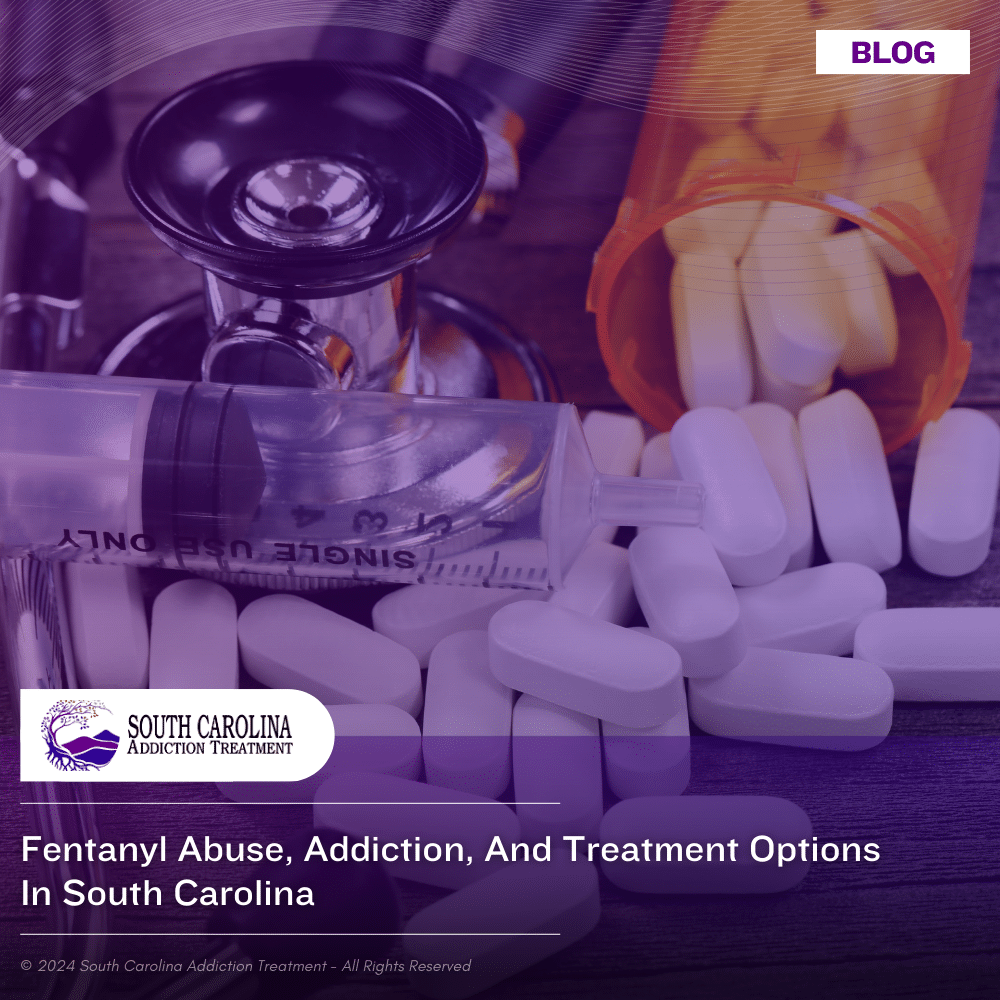Fentanyl Abuse, Addiction, and Treatment Options in South Carolina

Medically Verified: 2/1/24
Medical Reviewer
Chief Editor

All of the information on this page has been reviewed and verified by a certified addiction professional.
Fentanyl is a powerful synthetic opioid substance that is 100 times more potent than morphine and 50 times stronger than heroin. This drug is used medicinally to treat the symptoms of severe pain, usually after surgery or among chronically ill patients who are tolerant of less potent opioids.[1]
While this fentanyl is effective in managing pain, it is highly addictive and habit-forming. Additionally, the strength of fentanyl makes it dangerous to abuse. Unfortunately, many people who misuse fentanyl suffer from life-threatening overdoses.
According to the National Institute on Drug Abuse (NIDA), “Deaths involving synthetic opioids other than methadone (primarily fentanyl) has continued to rise with 70,601 overdose deaths reported in 2021.”[2]
Fentanyl abuse and addiction can be harmful to your mind, body, and those you love. Speak with an admissions counselor today to learn about your fentanyl addiction treatment options in South Carolina.
What is Illicitly Manufactured Fentanyl (IMF)?
While medicinal fentanyl is highly addictive, medical professionals only provide this medication when it is absolutely necessary. Prescription fentanyl is seldom abused, instead, individuals who abuse fentanyl are typically misusing illicitly manufactured fentanyl (IMF).
IMF is a type of fentanyl that is created illegally, so it is synthesized in illegal drug labs by criminal drug manufacturers. It is highly unpredictable because it is not regulated by the FDA.
While IMF is not the same as prescription fentanyl, it typically causes the same effects, including:[1]
- A rush of euphoria or extreme happiness
- Drowsiness and dizziness
- Nausea and vomiting
- Confusion
- Constipation
- Extreme tiredness or sedation
- Difficulty breathing
- Unconsciousness
Fentanyl is often used as an adulterant in other substances, so if you buy illicit opioid pills or powdered drugs like cocaine off of the street, you could accidentally ingest fentanyl. This often results in life-threatening overdoses, as the potency of the fentanyl can become too much for a person’s system to handle.
The Dangers of Abusing Fentanyl
While some of the overdose deaths associated with fentanyl are from poisonings and laced drugs, some individuals misuse the drug intentionally. More often than not, people who intentionally abuse fentanyl already have a tolerance for less potent opioids like heroin or oxycodone. Despite having a tolerance for opioid drugs, misusing illicitly manufactured fentanyl is incredibly dangerous due to the inability to determine its potency.
The main danger of abusing fentanyl is the risk of experiencing a fatal overdose. The signs and symptoms of a fentanyl overdose include:[3]
- Small, pinpointed pupils
- Falling asleep and losing consciousness
- Slowed, weakened, or stopped breathing
- Choking or gurgling sounds
- Limpness of the body
- Cold and clammy skin
- A blue tint of the skin especially on the lips and nails
If someone you love is overdosing on fentanyl, contact 911 immediately. If you have access to the opioid overdose reversal medication naloxone (Narcan), administer it as soon as possible.
Signs of Fentanyl Addiction
When it comes to fentanyl addiction, there are physical, psychological, behavioral, and even social signs that you can look out for. Typically, people who suffer from fentanyl addiction frequently display signs of intoxication like drowsiness, falling asleep, pinpointed pupils, and slurred speech.
Other signs of fentanyl addiction include:
- Isolating from friends and loved ones
- Spending a lot of time obtaining, thinking about, and using fentanyl
- Wearing long sleeves to conceal needle marks from IV drug use
- Mood swings, irritability, and even aggressive behavior
- Frequently passing out or falling asleep randomly (“nodding off”)
- Dealing with repeated life-threatening overdoses
- Experiencing uncontrollable urges or cravings to abuse fentanyl
- Needing more fentanyl to experience a desired effect (building a tolerance)
- Dealing with symptoms of withdrawal when they cannot abuse fentanyl
If your loved one is displaying the signs of fentanyl addiction, they must attend a professional drug rehab program.
How is Fentanyl Addiction Treated in South Carolina?
Fentanyl addiction must be treated with a full continuum of care that includes medical detox, medication-assisted treatment (MAT), evidence-based behavioral therapy, and aftercare planning. In South Carolina, most individuals being treated for fentanyl addiction will attend multiple rehab programs. These programs include medical detox, inpatient rehab, and outpatient treatment.
One of the most effective treatments for fentanyl addiction is medication-assisted treatment (MAT). MAT includes the use of traditional treatment methods like evidence-based therapies combined with the use of FDA-approved medications to manage withdrawal symptoms and prevent cravings.
The medications used to treat fentanyl addiction include:[1]
- Methadone (full opioid receptor agonist)
- Buprenorphine (partial opioid receptor agonist)
- Naltrexone (opioid receptor antagonist)
Medications like methadone and buprenorphine are used during detox to lessen the severity of withdrawal symptoms. On the other hand, naltrexone is used after detox is completed to prevent people from relapsing by curbing cravings for opioids.
Find Help for Fentanyl Abuse and Addiction in South Carolina
If you or a loved one suffer from a fentanyl addiction in South Carolina, it’s time to seek help. Fentanyl addiction often leads to multiple life-threatening overdoses and sometimes even death, so attending treatment is of the utmost importance.
At South Carolina Addiction Treatment Center, we can provide you with the tools and support you need to overcome fentanyl addiction. To learn more about our fentanyl rehab program, contact us today.
References:
- The National Institute of Drug Abuse (NIDA): Fentanyl DrugFacts, Retrieved July 2023 From https://nida.nih.gov/publications/drugfacts/fentanyl
- The National Institute of Drug Abuse (NIDA): Drug Overdose Death Rates, Retrieved July 2023 From https://nida.nih.gov/research-topics/trends-statistics/overdose-death-rates
- The Centers for Disease Control and Prevention (CDC): Fentanyl Fast Facts, Retrieved July 2023 From https://www.cdc.gov/stopoverdose/fentanyl/index.html

